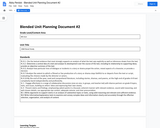
This unit walks students through a variety of activities revolving around George Orwell's book '1984'.
- Subject:
- English Language Arts
- Material Type:
- Unit of Study
- Provider:
- Michigan Virtual
- Author:
- Abby Perdok
- Date Added:
- 06/28/2017

This unit walks students through a variety of activities revolving around George Orwell's book '1984'.
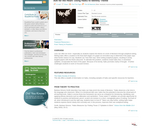
This lesson, designed for use alongside the writing of an analytical paper about literature, encourages students to use haiku poetry to more fully explore theme in their other writing.
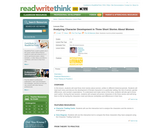
Students will read three short stories about women, written in different historical periods. Students will read each story and discuss the development of female characters in a particular setting, the role of women, gender differences, and society's expectations.

In this resource, students will compare and contrast a work of literature with at least one adaptation in a different genre or medium.
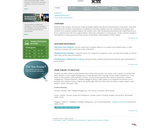
Students will read, analyze, and discuss Medieval English ballads and then list characteristics of the genre. Then they will examine the narrative characteristics of ballads by choosing a balad to act out. Using the Venn diagram tool, students will compare Medieval ballads with modern ones. Finally, students will compose and perform their own ballads.

This resource from the New York Times has students explore the play Antigone and a Spanish flamenco dance company's adaptation of the play. The lesson includes activities, graphic organizers and writing assignments.
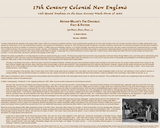
This article explains the ways in which Arthur Miller altered the historic events of the Salem Witch Trials in order to build the plot and characters of the dramatic work "The Crucible." A series of questions for consideration and discussion are at the end of the page.

This video from Shakespeare Uncovered explore artifacts from Shakespeare’s time that many scholars believe Shakespeare himself may have referenced when researching for his plays. As you view the videos and complete the activities in this collection, examine the evidence presented to support this claim.

Students learn alternatives to the classic classroom assignment, the book report.

By mimicking popular websites that relate the plot of movies, television shows, and real life events in reverse, students have the opportunity to review the plot in a more creative and challenging fashion. Using a snowclone (a verbal formula that is changed for reuse), students complete the phrase "If you read ____ backwards, it's about ____" to comment on the plots of novels.
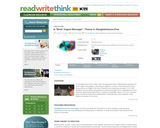
In this lesson plan students use literary perspective to analyze passages from Slaughterhouse-Five and then apply that perspective by creating a compilation album, CD cover, and liner notes that demonstrate their interpretation, understanding, and evaluation of the themes and ideas in the novel.

This lesson plan, intended to help students understand how to analyze a short story. Students use a note-taking chart to help break the story down as they read, then select quotations from the story that reflect their feelings as readers.

This lesson focuses on the film adapatation of The Color Purple, by Alice Walker. After reading the novel, students watch the movie in class and compare the two. Students compare and contrast the two versions of the story in writing at the end of the lesson.
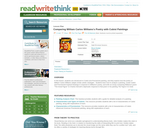
In this eight day unit, students will delve into the ways that the poetry of William Carlos Williams and Cubist and Precisionist paintings share similarities in approach. The culminating activity involves writing an essay comparing a poem to a painting inspired by that poem.
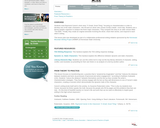
Students read Raymond Carver’s short story "A Small, Good Thing," focusing on characterization in order to develop one of the static characters—the hit-and-run driver who causes Scotty’s death—more fully. Students use a literary graphic organizer to analyze the three major characters. They compare the story to an older version titled "The Bath." Finally, they create an original anecdote involving the driver, share their stories, and respond to each other's writing.
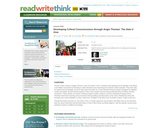
In this lesson from Read Write Think, students will read Angela Thomas' novel The Hate U Give and then delve into radio interviews that explain the purpose and viewpoints of Black Lives Matter. Topics of study include double consciousness/codeswitching, the Black Panther movement, Tupac Shakur as a an activist, and the complexity of gang culture. Students will explore subject material through excerpts form James Baldwin's essay "Letter from a Region in My MInd" and Ta-Nehisi Coates' "Letter to My Son."
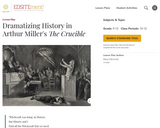
By closely reading historical documents and attempting to interpret them, students consider how Arthur Miller interpreted the facts of the Salem witch trials and how he successfully dramatized them in his play, "The Crucible." As they explore historical materials, such as the biographies of key players (the accused and the accusers) and transcripts of the Salem Witch trials themselves, students will be guided by aesthetic and dramatic concerns: In what ways do historical events lend themselves (or not) to dramatization? What makes a particular dramatization of history effective and memorable?
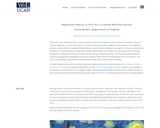
“Ekphrasis” is an obscure word for a common phenomenon: the impulse of artists of various media to compose creative responses to other artists’ work. In Greek, the word translates roughly into “description,” and “ekphrastic writing” is often defined as writing that describes an artistic product. However, description is only one among many elements in a successful piece of ekphrastic writing. What follows is an outline for a three-day unit in a creative writing class, designed to introduce students to the writing of ekphrastic poetry. The final assignment requires students to apply their knowledge of ekphrastic writing to works within the Washington and Lee collection. The course could easily be adjusted to cover ekphrastic prose, with an altered set of readings.

August Wilson's play "The Piano Lesson" readily invites students to ask a number of questions--big and small--about the characters, setting, conflict, and symbols in the work. After reading the first act students learn how to create effective discussion questions and then put them to use in student-led seminars after act one and again at the end of the play.
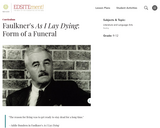
William Faulkner's self-proclaimed masterpiece, As I Lay Dying, originally published in 1930, is a fascinating exploration of the many voices found in a Southern family and community. The following curriculum unit examines the novel's use of multiple voices in its narrative.